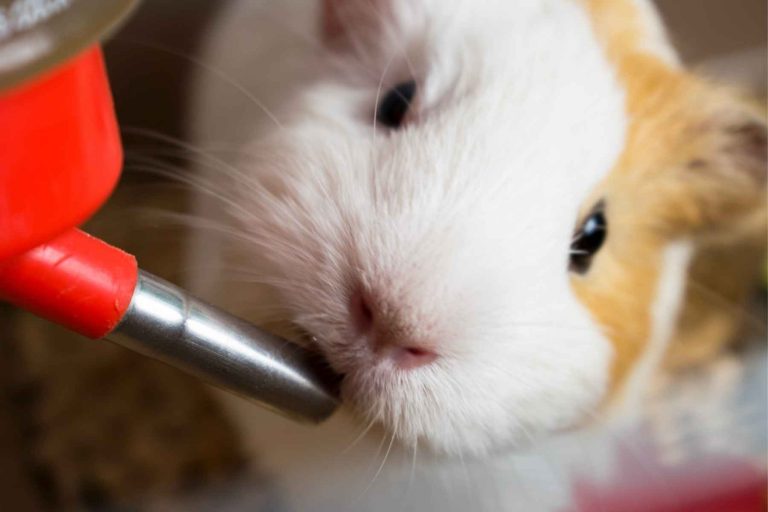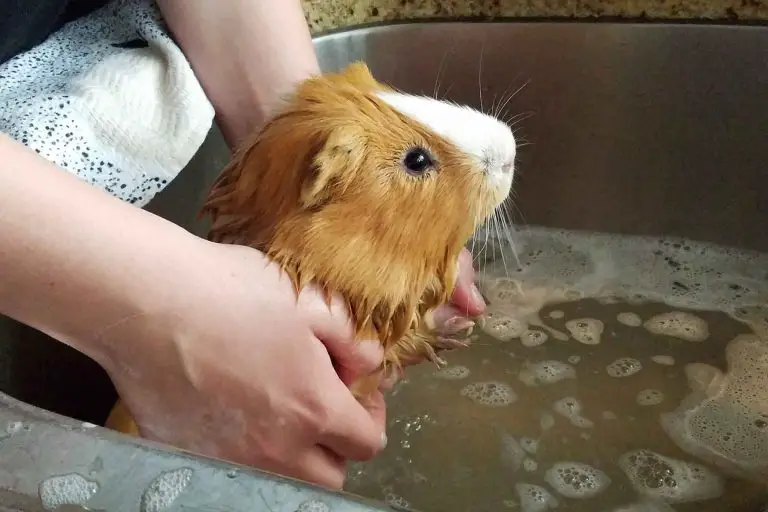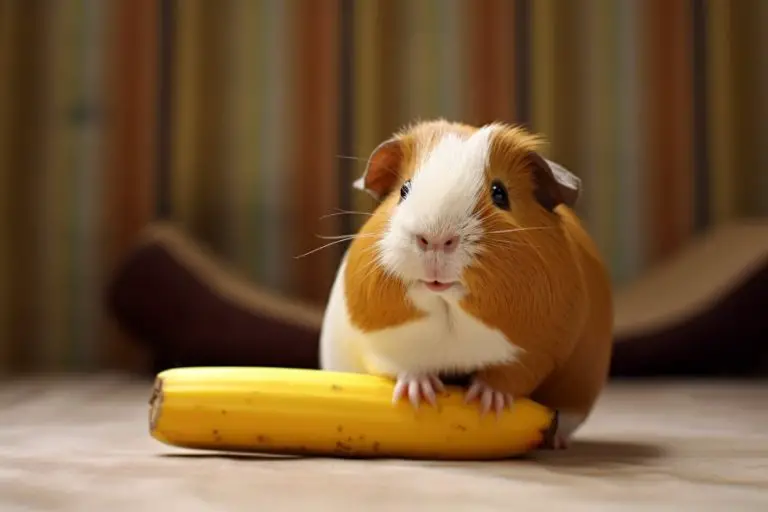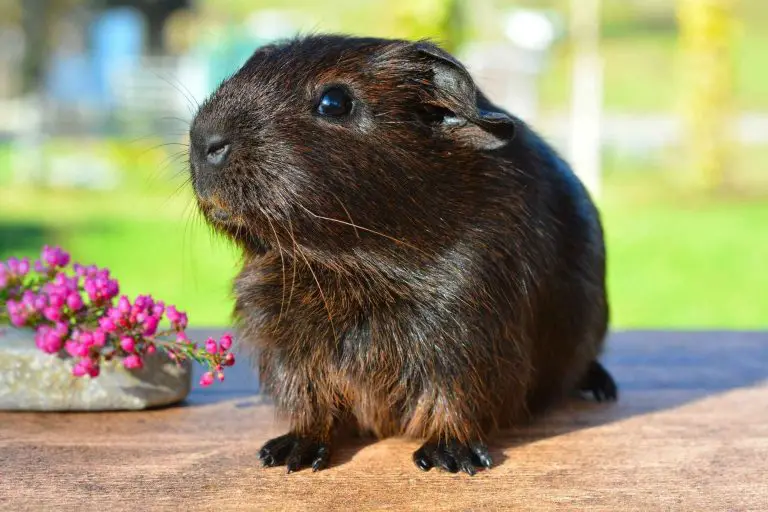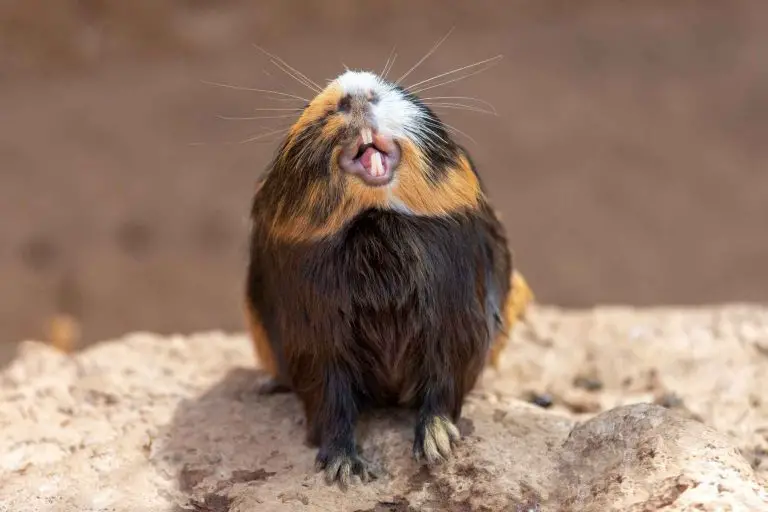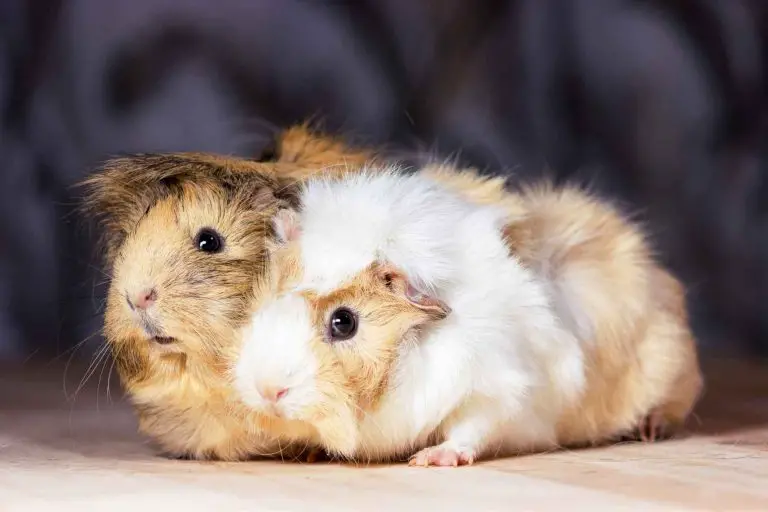What Do Guinea Pigs Eat?
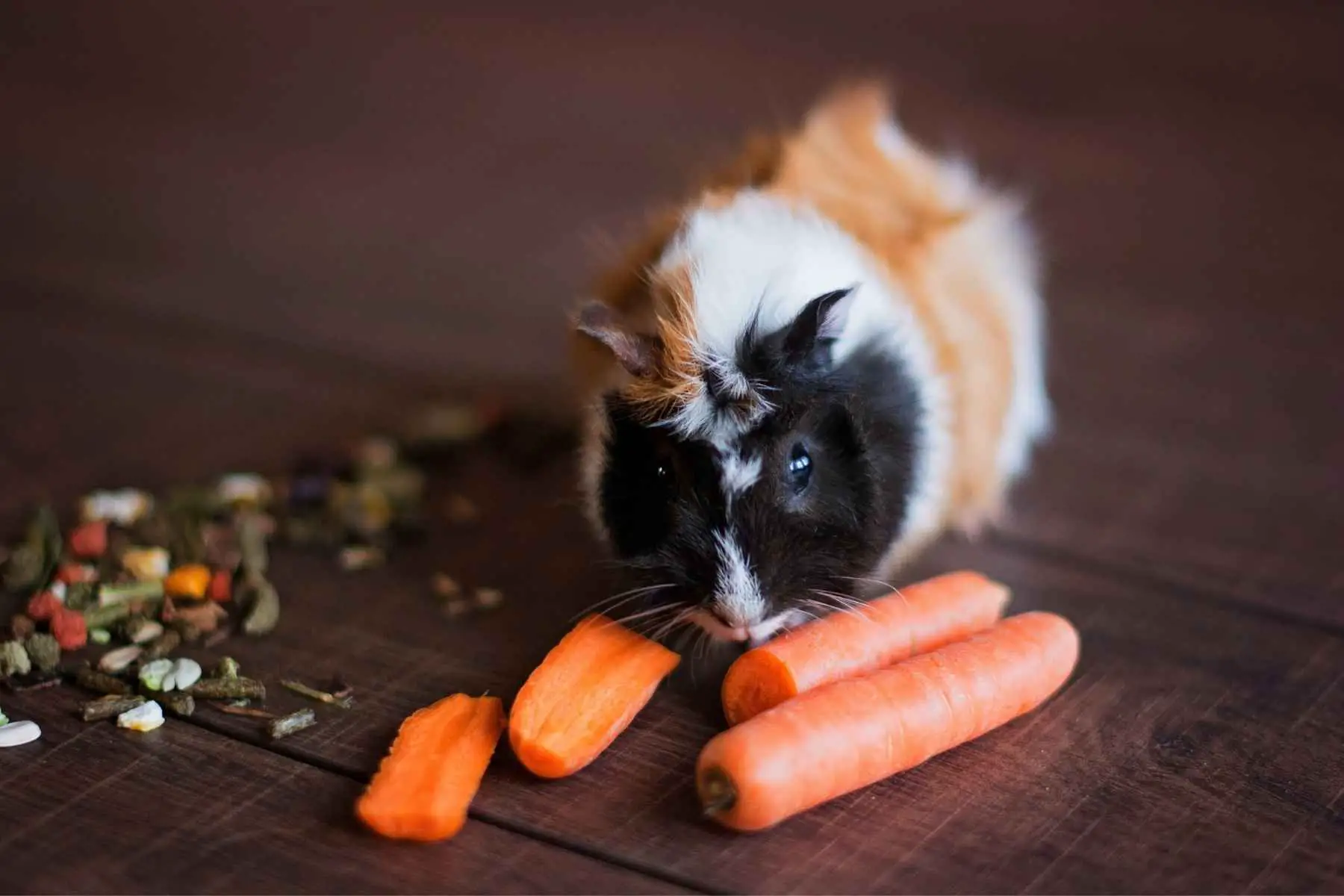
Guinea pigs are the cutest little creatures, and each one has its unique personality. Although many pet stores tout guinea pigs as starter pets, this is not true or fair. Guinea pigs need special care and gentle handling to bring out their trust, and they also need a special diet.
Guinea pigs primarily eat grass hay such as Timothy hay which is low in calcium and makes up around 80% of their diet. They also need good quality pellets with vitamin C fortification and a serving of vegetables daily. Guinea pigs enjoy fruit in moderation.
Guinea pigs are hindgut fermenters and have special requirements when it comes to their delicate digestion. Please read on to discover what guinea pigs eat, how much to feed them and how often.
Guinea Pig Dietary Requirements
The guinea pig is a herbivorous hindgut fermenter that practices caecotrophy, eating its cecotropes which look similar to their dung. As awful as this sounds, cavies need to eat their own pellets to ensure maximum nutrient absorption from their digestive systems.
However, this is a different substance from the cavy’s normal excrement, and it is called a cecotrope. The cecotrope forms from the non-fiber dietary components within the cecum and is different from the waste in that it forms an essential part of your Cavy’s nutrition.
Like rabbits, guinea pigs cannot properly digest the cellulose of plant matter the first time around. They need the beneficial bacteria in their guts to do this for them.
Cecotropes are small clusters of soft clusters filled with vitamins and amino acids.
Vitamins K and B12 are formed in the guinea pig’s gut by bacterial flora, and the guinea pig consumes this byproduct as a necessary step for proper nutrition.
Fiber Requirements
In their natural habitat, the herbivorous guinea pig consumes large quantities of vegetation. Their molar teeth are thus suited to grinding their food, and they have open rooted incisors that grow continuously through their lives.
Another reason guinea pigs need high fiber in their diet is to keep their teeth from growing too long. The grinding action of chewing fiber such as hay keeps their teeth at the proper length for healthy eating.
Guinea pigs need a high amount of fiber in their diet to be healthy. Cavies need fiber to maintain their gut’s bacterial flora and stimulate their gastrointestinal motility.
The guinea pig is simple stomached like a rat, mouse, or rabbit, but unlike the other rodents, the cavy’s entire stomach is lined with glandular epithelium.
Their intestines are particularly suited to develop gram-positive bacteria that allow them to absorb and digest their feed.
Best Fiber To Feed Your Cavy?
There are two types of fiber required by your healthy cavy, which includes:
- Digestible fiber. This type of fiber is broken down by enzymes and bacteria in the gut and provides energy, vitamins, and minerals throughout the body.
- Indigestible fiber. This type of fiber aids digestion and keeps proper digestive activities by moving the food in the gut.
Your fiber levels should always be higher than your protein content, and a lack of fiber leads to digestive upset, illness, and lowered immunity. A good protein level is around 15-16% crude protein in pellets, while fiber should always exceed 80% of your cavy’s diet.
Grass hay such as Timothy hay is best for your cavy and should always be available for your cavy to nibble.
Grass hay offers both indigestible and digestible fibers, and its low calcium content makes it safe to consume without restriction.
Vitamin C Requirements
Your cavy needs ascorbic acid or vitamin C because, like humans, they lack the enzyme L-gluconolactone oxidase, which they need to create their own vitamin C.
Because your cavy cannot produce its own vitamin C, you need to provide them with at least 10mg/kg daily, which you should seek in both ascorbic acid-enriched pellets as well vegetables and plants such as:
- Carrots
- Beetroot
- Bell pepper
- Tomato
- Cabbage
- Dandelions.
The effect of vitamin C deficiency is severe, and even three weeks of no vitamin C may cause:
Hypovitaminosis C, also known as scurvy. Scurvy can lead to other health conditions such as:
- Lameness
- Pain
- Anorexia
- Death (if untreated.)
Calcium Requirements
Although I discussed the detrimental effects of a diet too rich in calcium, the correct calcium levels must make up your cavy’s diet. Guinea pigs get calcium from their diet, but their hormone cycle does not regulate their calcium uptake.
However, guinea pigs with a calcium deficiency can lead to diseases such as fibrous osteodystrophy, poor bone quality, and susceptibility to bone fractures.
You should avoid green leafy vegetables that are too high in calcium, such as:
- Spinach
- Mustard greens
- Spinach.
Instead, feed your cavy greens with moderate calcium levels such as:
- Carrots
- Romaine Lettuce
- Cilantro.
Guinea pigs obtain calcium through their food. Therefore it is essential to provide them with a diet containing this mineral. However, their calcium uptake is not well regulated by their hormone cycle, so it is equally important not to give them food that is too high in calcium.
Many dark green vegetables contain high amounts of calcium and should be avoided or given only in small quantities and in moderation.
Special Dietary Requirements Young Guinea Pigs and Lactating Female
Young cavies need calcium to develop healthy bones. It would be best to feed them alfalfa hay or alfalfa-based pellets and grass hay. Alfalfa hay is high in proteins and calcium and is an excellent food for your growing little guineas.
You should aim to wean your baby guineas of the alfalfa when they are 4-6 months old. It would be best to wean the babies slowly to allow their digestive systems time to adjust to the dietary changes.
The high calcium levels of alfalfa are not suitable for adult cavies as they may lead to obesity or urinary tract infections.
Fruit and Vegetable Requirements
VCA animal hospital caution handlers against feeding fruits as the high sugar contempt may imbalance the cavy’s intestinal flora essential for their health. They suggest small amounts of vitamin c rich fruits such as kiwi, pear, and apple (no seeds!)
You should feed your cavy various vegetables daily but limit the feed to a single serving of each vegetable. Three small serving a day should suffice, ensuring that one is a green leafy offering.
If you introduce a new vegetable, always test if adding a particular feed causes soft stools or diarrhea.
Best Diet For Adult Guinea Pig Chart
| Foodstuff | Amount |
| Greens, vegetables | 3 servings/teacup |
| Fruit | Small single-serving bi-weekly |
| Grass Hay | Unlimted/adult cavy bodyweight |
| Vitamin C Enriched Pellets | ⅛ Cup Adult Cavy |
| Fresh Water | Unlimited |
What Can I Give my Cavy As a Treat?
Although pet stores offer a variety of guinea pig treats, many of them contain high v=carbs or sugars and are not entirely healthy for your cavy.
Treats should never exceed 0.5% of your guinea pigs’ total dietary intake, and fruits especially should be in small portions.
Fruits contain a high amount of sugar which can upset your cavy’s delicate digestive system.
If you wish to give a treat, which cavies love, don’t do it more than twice a week. Also, remember to prepare your fruit, such as removing seeds that can harm your furry friend.
Ideas for a small fruit treat include:
- Kiwifruit
- Berries
- Pineapple
- Watermelon
- Apples (skinned and cored.)
Otherwise, a veggie treat will also hit the spot with your vegetable-loving cavy. Ideas for a veggie treat include
- Ripe tomatoes
- Kale
- Artichokes
- Bell peppers.
Best Tips To Feed A Guinea Pig
Guinea pigs are notoriously fussy little creatures regarding their preferred feed.
Wild cavies are foragers who choose what they want to eat and when they want to eat; however, there are ways to ensure that your cavy gets all its nutrition.
- Always introduce new foods gradually. Cavies hate changes in their set routine and often select the food they are willing to eat when they are still young. If you change your feed, introduce it slowly so that they can get used to the new food.
- Get to know your particular cavy. Each cavy has a different personality and will let you know which food they love to nibble through whistles and songs.
- Arrange a feeding schedule. Cavies thrive on routine, and setting aside a daily feeding schedule makes them less inclined toward fussiness. It would be best to feed your cavy twice a day, morning and night.
- Remove uneaten food after an hour or two. Guinea pigs may lose interest in food that you serve in big portions and is always available. Remove uneaten food after an hour or two, or reduce your portion sizes.
- If there are pellets left over each day, reduce your portion sizes. Leftover pellets daily may mean that you are feeding too much. An eighth of a cup a day is all you need pellet-wise.
Guinea Pig Foods To Avoid at All Costs
Guinea pigs have sensitive digestive tracts, and their reliance on healthy intestinal flora for nutrition makes them particularly susceptible to harm from foreign foodstuffs.
Soke food can lead to fatal cases of enterotoxaemia, which is a toxic overgrowth of harmful bacteria in your guinea pig’s intestinal tract.
Foods to avoid at all costs include:
- Cereals
- Grains
- Dairy
- Nuts
- Seeds
- Dried beans
- Peas
- Crackers
- Breakfast cereals
- Sugary treats
- Bread
- Chocolate (Poison)
- Onions
- Avocado
- Onion Grass
- Potato tops
- Mushrooms
If you allow your cavy in the garden, ensure they do not eat:
- Rhubarb leaves
- Lilies of any kind
- Foxglove
- Daffodils
- Oak
- Grass treated with herbicide or fertilizer
Closing Notes
If you are like me, your guinea friends are part of your family, and you should always try and give them the best life possible.
Part of ensuring your cavy’s health is to provide the necessary nutrition and, of course, love.
To keep your cavy popcorning and singing you their silly songs. After all, they are lovable creatures and deserve the best from their human families.

